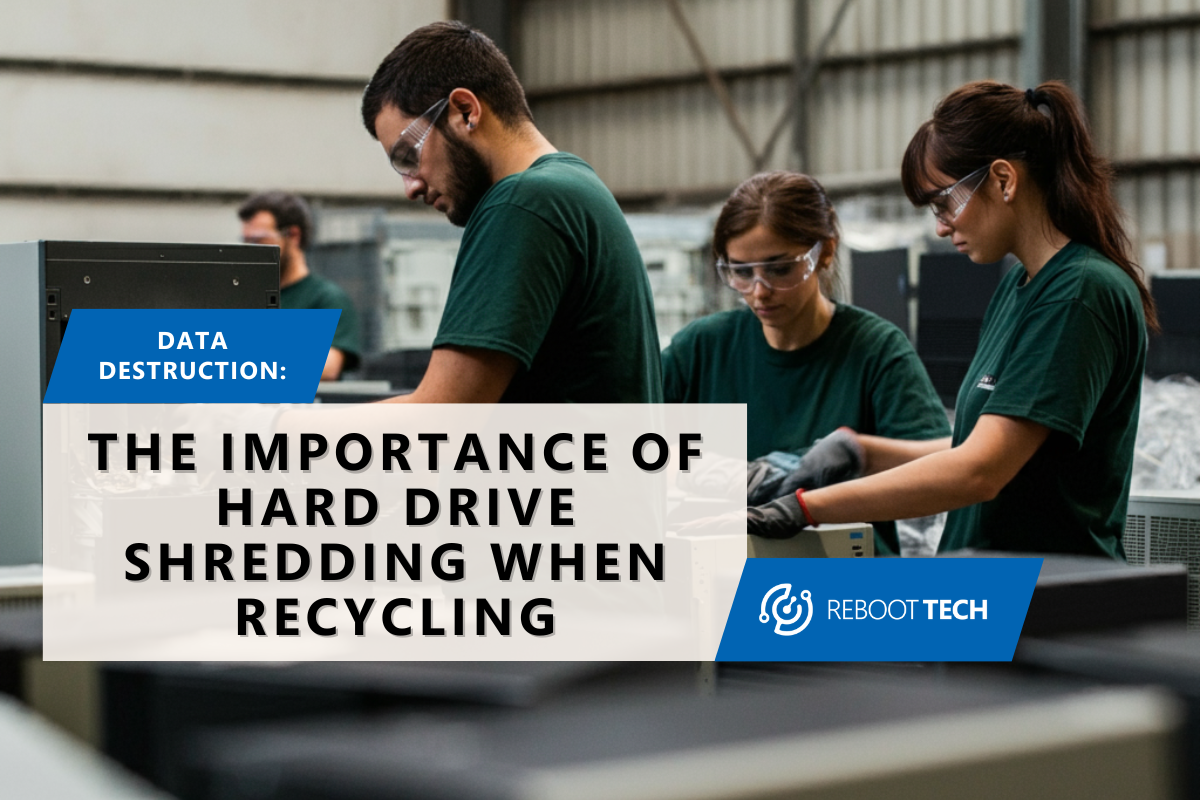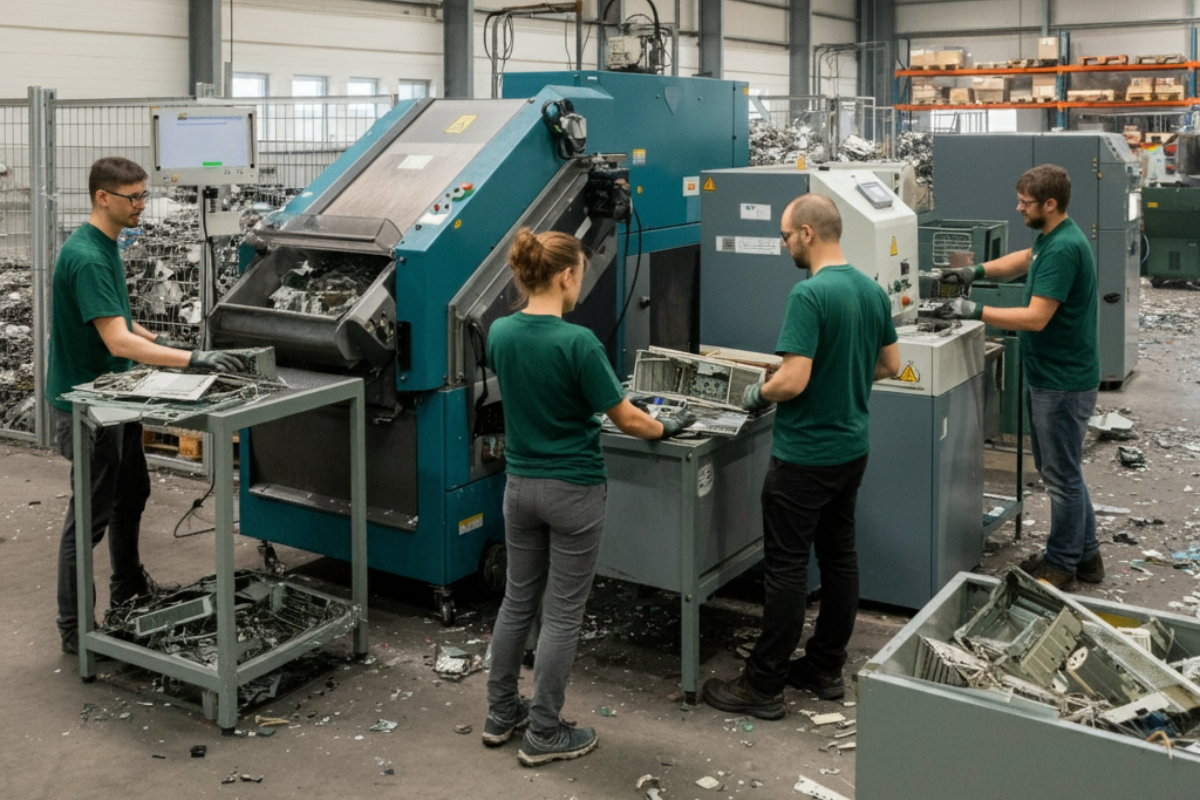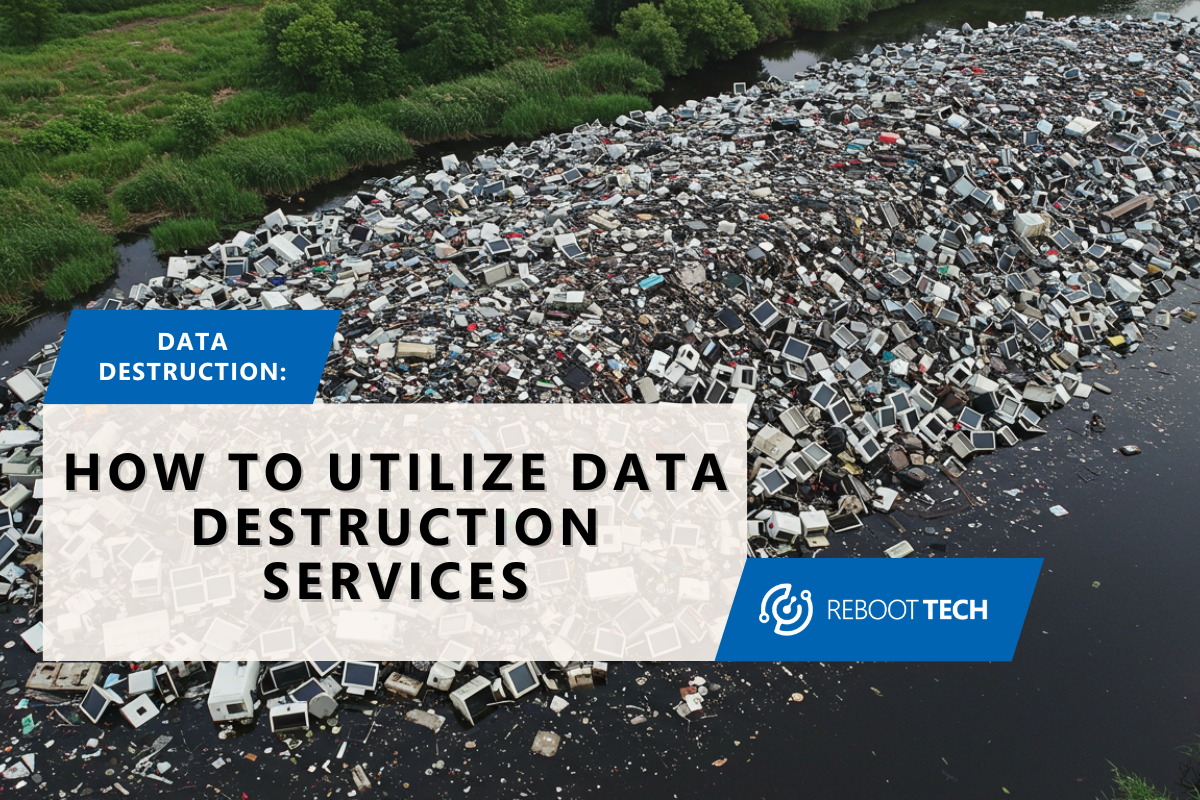
Why Hard Drive Shredding Matters in Recycling
Have you ever wondered what happens to all the data stored on hard drives in old computers and electronic devices when they’re disposed of? Recycling your old electronics is important for sustainability. However, there is one key step to protect your information: shredding your hard drive. Just erasing files isn’t enough; to ensure the data can’t be retrieved, you must physically destroy hard drives.
In this article, we will explore why hard drive shredding is important when recycling electronics. We will discuss how it is the safest way to protect your data. We will explain how working with certified IT Asset Disposition (ITAD) companies, like Reboot Tech, can help. They make the process easy. They also ensure it is secure and eco-friendly. Whether you’re a business concerned with compliance or an individual safeguarding personal information, hard drive shredding is a key part of responsible e-waste management.
What is E-Waste?
E-waste (electronic waste) includes any discarded electronic devices, such as computers, cell phones, tablets, and televisions. With constant technological advancements, devices often become outdated quickly, contributing to growing amounts of e-waste each year. As of recent reports, e-waste accounts for about 70% of the toxic waste found in landfills globally. E-waste contains harmful materials like lead, mercury, and cadmium, which can contaminate soil and water, impacting ecosystems and human health.
E-waste includes everything from smartphones to large servers, and nearly every electronic item has a storage component that retains data, even after it’s been “deleted.” Without proper handling, these devices pose risks of data breaches and environmental harm. Hard drive shredding ensures that, as these devices are recycled, their data is irretrievable.

The Problem with Hard Drive Recycling
Recycling electronic devices without properly erasing data from hard drives can leave sensitive information vulnerable. Unlike deleting files or even formatting a hard drive, data often remains retrievable until it is thoroughly destroyed. Cybercriminals and hackers are known to extract data from improperly disposed-of electronics, leading to risks such as identity theft, financial fraud, and data breaches.
The risks are especially significant for businesses, which often store confidential customer information, employee records, and proprietary data on their devices. A data breach due to improper disposal can lead to serious legal and financial consequences and damage an organization’s reputation. Hard drive shredding offers peace of mind by ensuring no data can be retrieved, even with advanced recovery techniques.
How to Recycle Hard Drives While Keeping Your Data Safe
When recycling hard drives, data security should be a priority. Here are some common methods to keep your information secure:
1. Data Wiping: Using software to wipe a hard drive removes files but may not completely erase them. Although this method is effective for general use, it is not foolproof against sophisticated data recovery methods.
2. Degaussing: Degaussing exposes a hard drive to a strong magnetic field that erases stored data. While degaussing is effective, it only works on magnetic storage devices like hard drives and not on solid-state drives (SSDs).

3. Hard Drive Shredding: Shredding is the most secure method because it physically destroys the hard drive, rendering data completely irretrievable. This process involves breaking the drive down into small fragments, ensuring data cannot be reconstructed.
Hard drive shredding provides the best protection against data theft, particularly for businesses handling confidential data. This method ensures total data destruction and is often the preferred choice for industries with strict compliance requirements, like healthcare and finance.
Working with an IT Asset Disposition Company
Choosing a certified IT Asset Disposition (ITAD) company can simplify the hard drive shredding and recycling process. ITAD providers specialize in securely handling end-of-life electronic assets and ensuring compliance with industry regulations. Here’s how partnering with an ITAD company like Reboot Tech can be beneficial:
- Certified Data Destruction: Reboot Tech provides verified shredding services, offering clients a certificate of destruction after each shredding session. This certificate serves as proof that data was handled securely, which is essential for industries regulated by data protection laws.
- Compliance with Regulations: Many sectors, such as healthcare and finance, must adhere to laws like HIPAA and GDPR, which mandate secure data disposal. Reboot Tech helps businesses stay compliant by offering destruction methods that meet or exceed industry standards.
- Sustainable E-Waste Management: As a certified e-waste recycler, Reboot Tech ensures that all materials from shredded hard drives are disposed of in an environmentally friendly way. Components are either repurposed, reused, or disposed of responsibly, reducing the impact on landfills.
- Convenience and Efficiency: Handling e-waste on your own can be time-consuming, particularly if there are many hard drives to process. Reboot Tech provides convenient pickup services and efficient processes for managing large volumes of e-waste, saving businesses time and resources.
Steps to Take Before Recycling Your Hard Drive
Before sending hard drives for recycling, there are a few steps you can take to ensure all sensitive data is protected:
1. Backup Important Data: Before erasing any hard drive, make sure to back up any important data. This ensures you retain all essential information before the drive is permanently destroyed.
2. Encrypt Sensitive Information: If you’re concerned about sensitive data on a drive, consider encrypting the files. Encryption adds an extra layer of protection, making it more difficult for anyone to access the information.
3. Work with a Certified Recycler: Verify that your recycling provider follows best practices for data destruction. Certification by organizations like the EPA, NIST, or ISO shows that a company complies with stringent data security and environmental standards.
By taking these precautions, you can ensure data security even after your hard drive leaves your possession.

Hard Drive Shredding for Safe and Responsible Recycling
Hard drive shredding is more than just a secure method for disposing of data—it’s a crucial part of responsible e-waste recycling. As we generate more e-waste each year, it’s essential to ensure data is handled safely and disposed of responsibly. Shredding provides the highest level of security by physically destroying the hard drive, ensuring that sensitive information cannot be recovered.
Partnering with a certified ITAD provider like Reboot Tech can make the process straightforward, secure, and eco-friendly. Reboot Tech offers certified shredding services that meet industry standards for data protection and environmental responsibility, providing peace of mind for businesses and individuals alike.
Recycling your hard drives with proper data destruction doesn’t just protect your information—it’s a sustainable choice that contributes to the circular economy. Whether you’re an individual or a business, investing in professional hard drive shredding is a wise decision for data security and environmental health.





